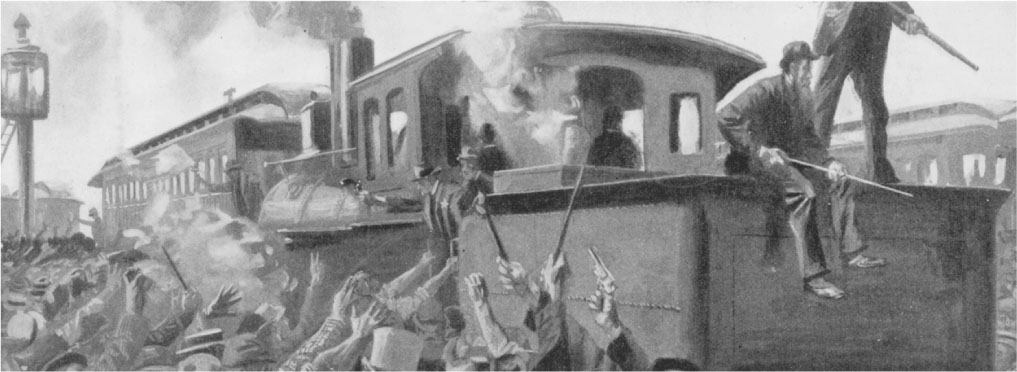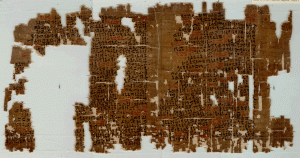
George Mortimer Pullman was an engineer and ambitious entrepreneur. He found success as a building contractor. In 1867, Pullman created a new line of luxury railroad cars featuring comfortable seating, restaurants, and improved sleeping areas known as Pullman coaches. Following his success in 1867, he built a town on a four thousand acre piece of land. There, twenty-seven years after his initial success, one of the most dramatic events in United States labor history took place: the Pullman Strike.
In 1880, near Lake Calumet on the southwest edge of Chicago, the village of Pullman was built. His town contained a hotel, a school, a library, a church, and office buildings, as well as parks and recreational facilities. Pullman also built houses with indoor plumbing and gas heating. He managed his town as he did his other businesses; he leased the housing to his workers.
Many factors contributed to the economic downturn of 1893. The nation’s gold reserves dropped drastically, federal spending depleted U.S. Treasury surpluses, and finally the passage in 1890 of the Sherman Silver Act culminated in the financial panic of 1893. 1 All of these events unleashed a domino effect on the American economy. Corporations failed, resulting in mass layoffs. Many banks also closed, unable to keep afloat during this chaotic time. Combined, all of these closures and general uncertainly plunged the country into a major economic depression. Pullman’s response to the crisis was to fire more than a third of his workforce; he instituted reduced hours and cut the wages for the remaining hourly employees by more than twenty-five percent. Because Pullman had promised the town’s investors a six percent return, there was no corresponding reduction in the rents and other charges paid by the workers. Rent was deducted directly from their paychecks, leaving many workers with no money to feed and clothe their families.2
In desperation, many of Pullman’s workers joined the American Railway Union (ARU). Eugene V. Debs was the organizer of the ARU and well known for a strike against the Great Northern Railway company. In May of 1894, Pullman workers went on strike. Workers agreed to permit trains carrying the U.S mail to operate as long as they did not contain Pullman cars. Railroads refused to participate. Despite Debs’ opposition, an ARU convention voted to stop handling Pullman cars after the company ignored efforts to settle the dispute. The union, by detaching Pullman cars from the trains, sought to deplete the revenues of the Pullman Palace Car Company (PPCC) and force negotiations.3 George Pullman refused to negotiate. As the strike proceeded, rail lines were shut down and the railroads formed the General Managers Association (GMA), an organization of twenty-four railroad companies operating in or through Chicago. The railroads were determined to honor their contracts with the PPCC, insisting that trains run with Pullman cars attached. Alarmed at the rapid growth of the ARU, they were eager for a chance to crush it.4

The ARU responded with a union walkout, and fifty thousand railroad workers walked off from their jobs. When striking workers refused to spread out and end the strike, U.S. attorney general Richard Olney, who supported the GMA, obtained an order holding the workers in contempt, declaring the strike illegal. Richard Olney requested federal troops, saying they were needed to move the mail, and President Grover Cleveland sent more than two thousand troops to Chicago. Rioting and fighting broke out between the troops and the strikers. Many strikers were killed and wounded by the troops. Debs was arrested and charged for disobeying the court order and for conspiracy to obstruct the U.S. mail. Debs spent six months in prison. Many workers returning to their jobs found out that they had been permanently replaced and blacklisted from future railroad work.
The failure of the strike was a major defeat for labor unions in the United States. The ARU fought for what they believed was right as labor workers, but with the unfortunate disagreement, and the undesirable fight against business management, and no agreement between both ARU and GMA, the strike came to an end by the federal government.5 Clearly, the Pullman Strike of 1894 was not only a defeat for American labor, but it had a significant impact on the life and welfare of American workers for decades. One legacy of this event, however, was the federal government’s decision to declare a national holiday, known as Labor Day, six days after the end of the strike.
- Columbia Electronic Encyclopedia, 6th Edition, April 2016, s.v. “Sherman Silver Purchase Act.” ↵
- Salem Press Encyclopedia, January 2015, s.v. “Pullman Strike,” by Merl E Reed and Irwin Halfond. ↵
- Salem Press Encyclopedia, January 2015, s.v. “Pullman Strike,” by Merl E Reed and Irwin Halfond. ↵
- Salem Press Encyclopedia, January 2015, s.v. “Pullman Strike,” by Merl E Reed and Irwin Halfond. ↵
- Salem Press Encyclopedia, January 2015, s.v. “Pullman Strike,” by Merl E Reed and Irwin Halfond. ↵




42 comments
Maria Luevano
What an interesting article considering this strike led to the creation of the Labor day holiday. I have never heard of the Pullman strike, but you did a great job explaining it. The history of labor is truly fascinating and could not imagine working in conditions some people had to encounter. Overall Great Job! I really enjoyed learning about this strike.
Samuel Vega
The article is a good summary of the Pullman strike and how the Pullman workers joined the American Railway Union. It describes the struggles of the strikers and how President Cleveland sent 2,000 federal troops to defuse the situation. What I did not recall was how the federal government declared Labor Day, as a national holiday, six days after the strike.
Aurora
Yes, when I wrote this article and was doing the research this was something new to me and at “aw,” that this was the reason for Labor Day. Thank you for your nice comment.
Aaron Sandoval
This article was really well done, this period in American history has always been a favorite of mine, and I have enjoyed learning about the many labor issues that emerged at the time. I had known a little about the Pullman Strike, but I did not know a lot about the event and this article was really good at telling the story of why the strike started, and how it ended.
Antonio Holverstott
Pullman’s decision to remove certain employees from his railroad car company was made in poor judgment. Instead of lowering wages for all employees, including those who were supervisors in the factory, and surrendering personal assets to ensure the survival of his company, he decides to reduce the size of his company by two-thirds, leaving many employees into the path of poverty. The employees did have a right to be upset with Pullman, however, some of their responses to the situation were not made in the best judgment. Joining a union to restore your job is morally honest, but causing others to stop rail travel that was, in some cases, needed for the distribution of mail by the US Post Office was not.
Jose Chaman
What Mr. Pullman did in reducing costs and firing employees is a natural reaction to market behavior during those times. The lack of economic policies focused on short periods of time (the short-run) made this type of situation abound between the end of the ninth century and the beginning of the twentieth century, as an example of this is the Great Depression. If we focus on the side of the workers’ revolt against Pullman, it is interesting that they have been defeated without any agreement in between, I suppose this was an example to begin negotiations between Labor Unions and companies instead of using revolts.
Cynthia Perez
Before reading this article I never thought much about labor day, just that it was a day off a school to be honest. Learning more about what lead to the creation of this day though was a great topic to understand more about. The Pullman strikes being one of many labor strikes that illuminated the treatment of workers and people who endure harsh jobs for unfair pay fighting to keep a stable life. Great article that was very informative to a national holiday and event of protest.
Vania Gonzalez
Many of these strikes went down in history but this one since it was not successful like the other strikes. The Pullman strike just really shows how laborers really wanted change in their rights. I also did not know that this strike was the one that basically created Labor Day a holiday that is widely celebrated today.
Mara Martinez
I have heard of a lot of the labor strikes that occurred throughout history. Many I have heard great detail of but never really took the time to remember about. This article really brought up the memory of when I learned about this strike. But I had no clue that this was the strike that lead to the start of Labor Day. Absolutely no idea. Thus this article now holds importance to me as I now know something new.
Felicia Stewart
This article was very well written! I was not familiar with this strike prior to reading the article, and I definitely was not aware that this strike was the reason that we now have Labor Day. During this period many people have tough jobs and they would endure harsh working conditions for very little pay, and we still see this today in many factories and businesses in other countries. It is sad that people have to endure such things in order to provide for their families.
Bianca-Rhae Jacquez
I’ve heard of the countless labor strikes that have happen throughout history but I didn’t know about the Pullman strike. I had no idea that this strike lead to the creation of Labor day. Its astonishing that the rights or laborers have changes so dramatically over time. This was an amazing article and I loved reading about something I didn’t know.